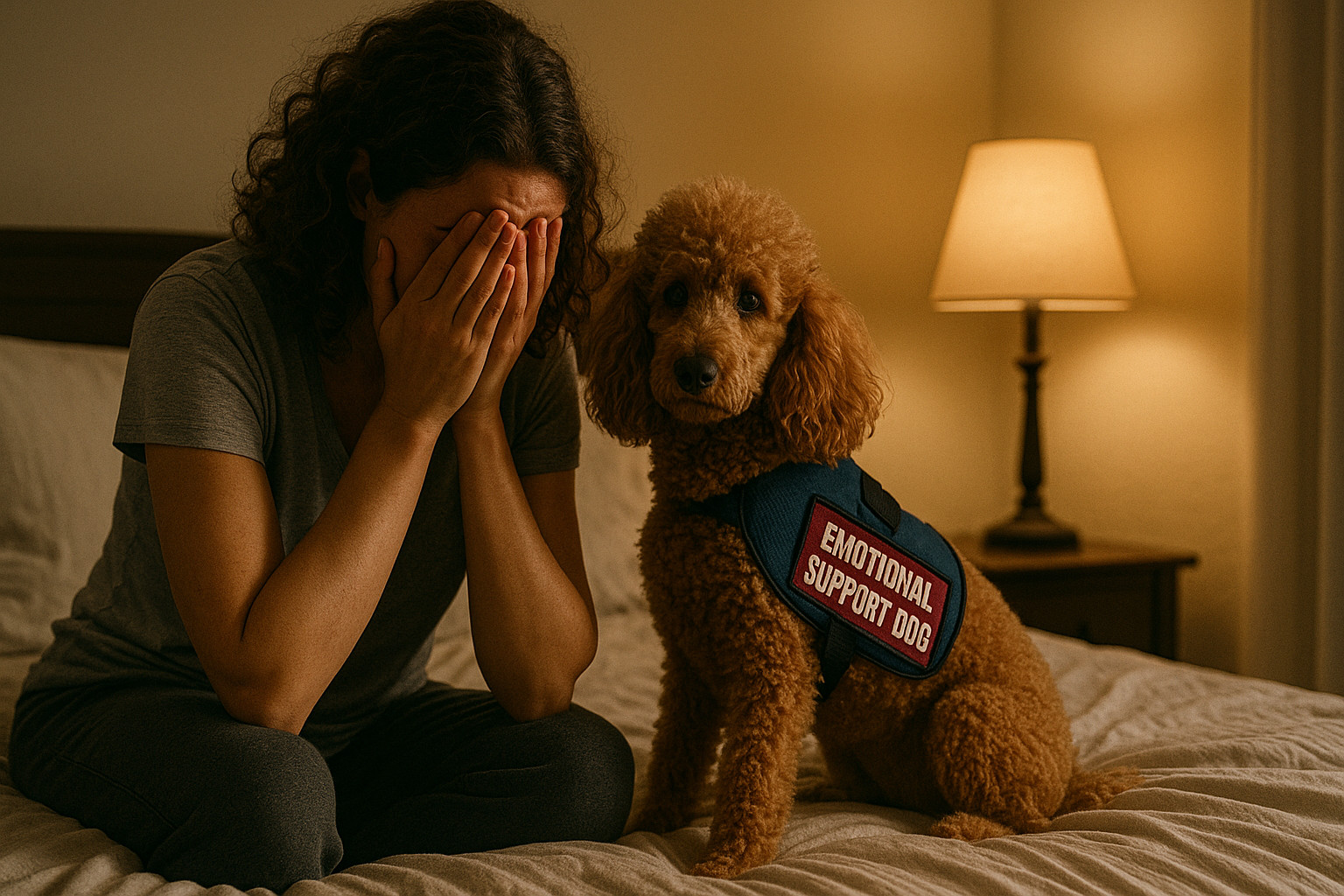Poodle as an Emotional Support Dog

The Poodle is renowned for its intelligence, elegance, and adaptable personality, making it an excellent choice as an emotional support dog. While often believed to be a breed reserved for the affluent few, Poodles have a rich history of being trusted companions. This article examines the Poodle's suitability as an emotional support animal, exploring their natural temperament, adaptability, and care requirements.
Understanding the Emotional Support Role
Poodle Overview
Poodles come in three sizes: Toy, Miniature, and Standard, each offering unique benefits as emotional support dogs. These dogs are recognized for their remarkable intelligence—often regarded as one of the smartest breeds—and their trainability, which naturally lends to emotional support roles. The breed's sensitivity and intuition allow them to attune to their human's emotional needs, providing comfort and stability.
Temperament and Emotional Connection
Poodles are characterized by their gentle and friendly nature. Their temperament is typically well-balanced, which is ideal for providing emotional support. They possess an innate ability to sense and mirror human emotions, offering comfort simply by being attentive companions. A Poodle's intelligence and empathy foster deep emotional bonds with their owners, making them suitable for individuals who require emotional stability.
- Intuitive Understanding: Poodles are adept at picking up on emotional cues, often offering presence and gentle reassurance without the need for directive commands.
- Affectionate Nature: Their affectionate disposition encourages a nurturing connection, providing companionship during times of stress or loneliness.
Adaptability and Daily Behavior
Poodles are highly adaptable dogs. Whether living in a bustling city apartment or a quiet country home, they adjust well to varying environments. This adaptability extends to their daily behavior, where they can be either active or relaxed, matching the lifestyle of their owner.
- Versatility in Energy Levels: Poodles can engage in play or settle for a calming night in, making them ideal for individuals with fluctuating energy levels.
- Routine Flexibility: They handle changes in routine with grace, ensuring they remain a constant source of support regardless of life's unpredictability.
Situations Where Poodle Provides Strong Support
Poodles are particularly effective in providing support in various situations:
- Anxiety Reduction: Their calming presence can alleviate anxiety, providing comfort through tactile engagement, like petting or cuddling.
- Combatting Loneliness: Because they form strong attachments, they can be invaluable to individuals experiencing loneliness, ensuring the owner feels connected and loved.
- Stress Alleviation: Their joyful demeanor and playfulness can be an antidote to stress, bringing light-heartedness into the home.
Ideal Living Environments
Poodles thrive in environments where they receive ample attention and are seen as a part of the family. Their size variety allows them to suit different living arrangements:
- Apartments: Toy and Miniature Poodles adapt well to apartment living, requiring less space and excelling in environments where they can be frequently pet or near their owner.
- Family Homes: Standard Poodles can benefit from larger living spaces, participating actively in family life.
- Assisted Living: Their gentle temperament and size versatility make them ideal in assisted living scenarios where consistent companionship is beneficial.
Bonds with Different Types of People
Poodles are remarkably adaptable to different interpersonal dynamics. They are known for establishing deep connections with:
- Elderly Individuals: Providing continuous comfort and lowering feelings of isolation.
- Children: Standard and Miniature Poodles are especially patient, enjoying the playful interaction with children.
- Individuals with Mental Health Challenges: Their empathy and support help in stabilizing emotional states, offering a safe, non-judgmental space.
Health, Care, and Wellbeing
Common Health Considerations
Maintaining a Poodle's health is crucial in ensuring they can fulfill their role as an emotional support dog effectively. Poodles are prone to certain genetic conditions, such as:
- Hip Dysplasia and Eye Disorders: Regular veterinary check-ups are necessary to prevent or manage these conditions.
- Allergies and Skin Conditions: Monitoring and managing their diet and environment can mitigate these concerns, maintaining their comfort and attentiveness as companions.
Grooming, Comfort, and Maintenance Needs
Poodles require regular grooming due to their unique coat type, which, while non-shedding, can mat if not properly maintained.
- Coat Care: Regular grooming is mandatory to manage their hypoallergenic coat, preventing discomfort.
- Exercise Needs: Moderate exercise helps maintain their physical and emotional health, ensuring they remain energetic yet calm companions.
Preparing a Poodle for Emotional Support Work
Socialization and Responsiveness
Proper socialization is key to a Poodle's effectiveness as an emotional support animal. Early exposure to diverse environments and individuals ensures they remain calm under varying circumstances.
- Training: Employing positive reinforcement training enhances their innate responsiveness and makes them reliable supports.
Managing Stress and Emotional Cues
Poodles are naturally adept at reading human emotion, but training them to respond appropriately to specific cues can optimize their supportiveness.
- Developing Emotional Responsiveness: Encouraging consistent exposure to their owner's emotional landscape teaches them how to react suitably to both high-stress and tranquil moments.
Strengths, Challenges, and Ideal Homes for Poodle
Final Thoughts
Poodles excel as emotional support dogs due to their intelligence, sensitivity, and adaptability. They provide invaluable support in managing stress, alleviating loneliness, and offering companionship, all while requiring a commitment to their care and grooming needs. Understanding each size's specific benefits ensures a harmonious match between the Poodle and their environment, enabling them to fulfill their supportive role effectively.
Key Takeaways for the Poodle as an Emotional Support Dog
- Best suited for: Those seeking a sensitive, intuitive, and adaptable emotional companion.
- Not ideal for: Individuals unable to commit to regular grooming and moderate exercise.
- Emotional traits: Highly empathetic, deeply affectionate, and intelligent.
- Care and health notes: Require regular grooming, moderate exercise, and attention to potential genetic health issues.
- Environments where they provide the most comfort: Apartments with their owner present, family homes, assisted living, and with individuals experiencing mental health challenges.











